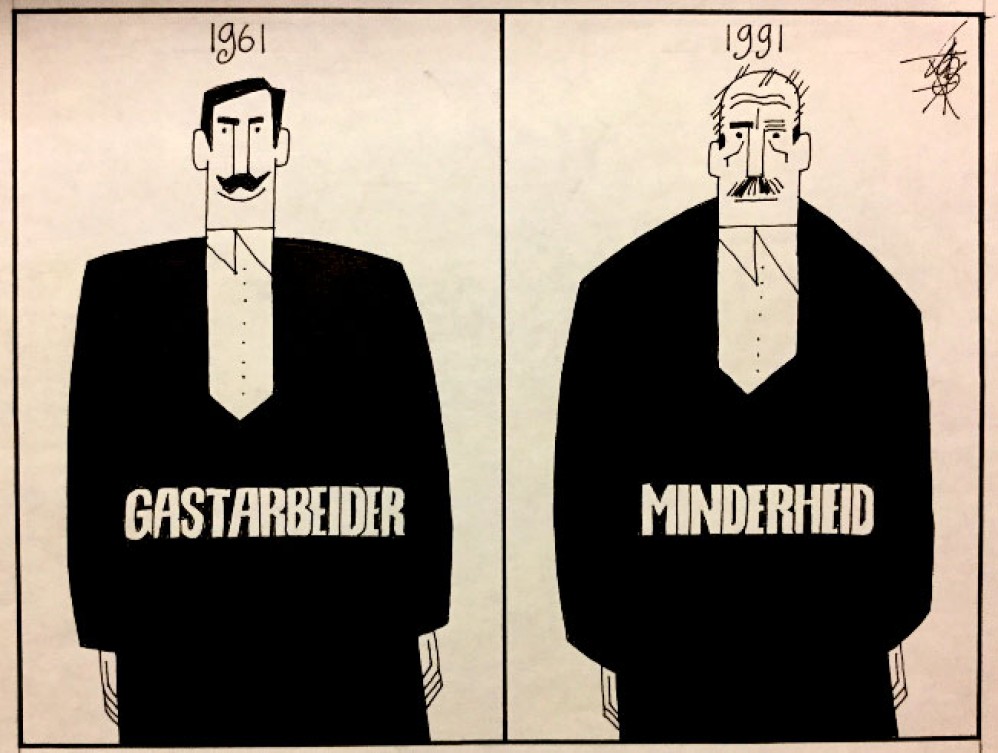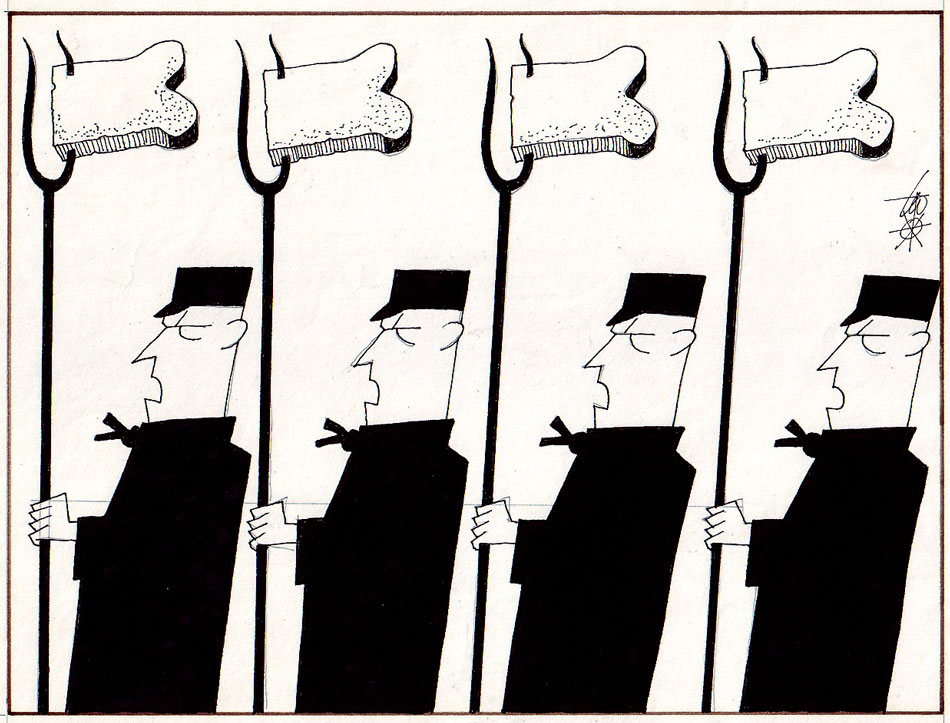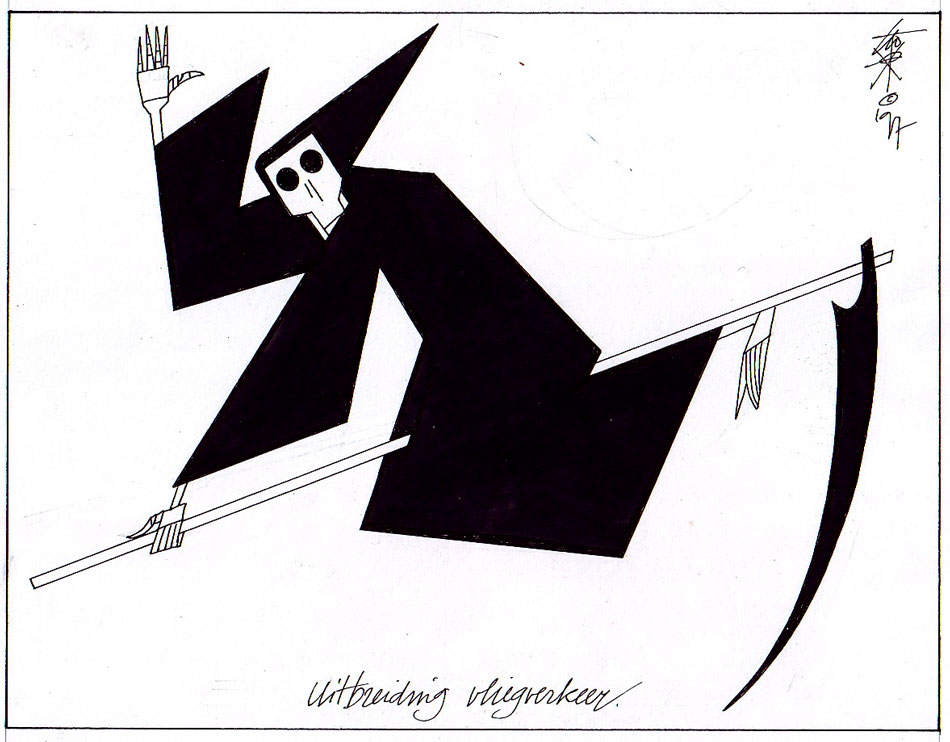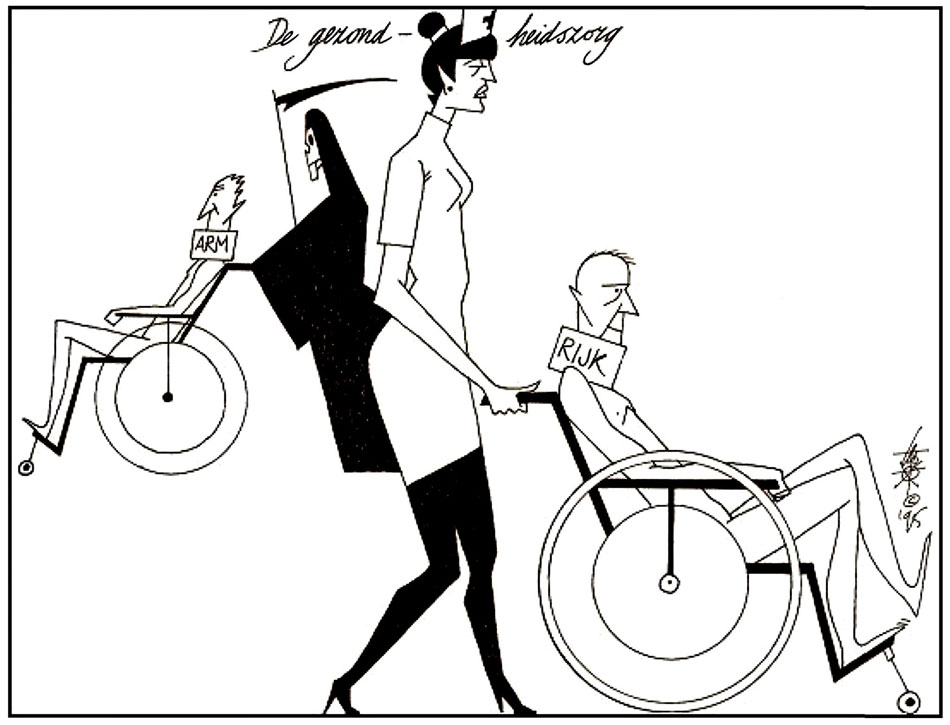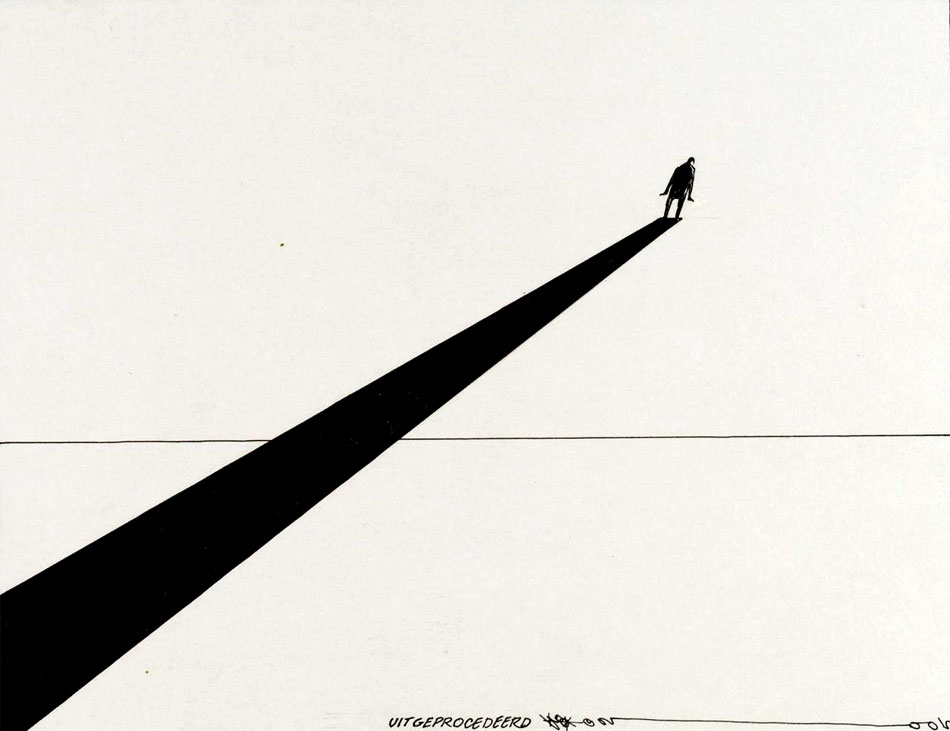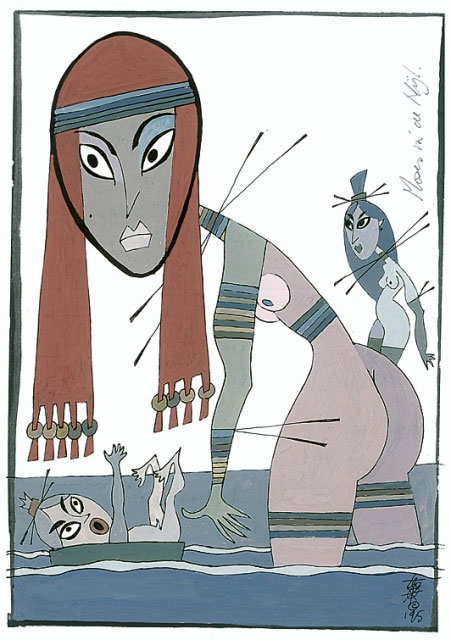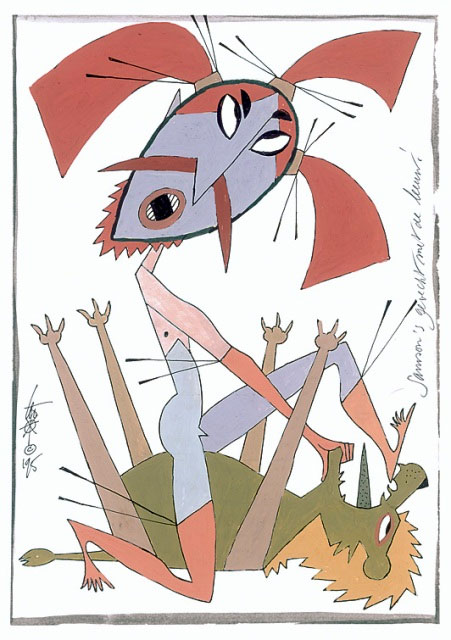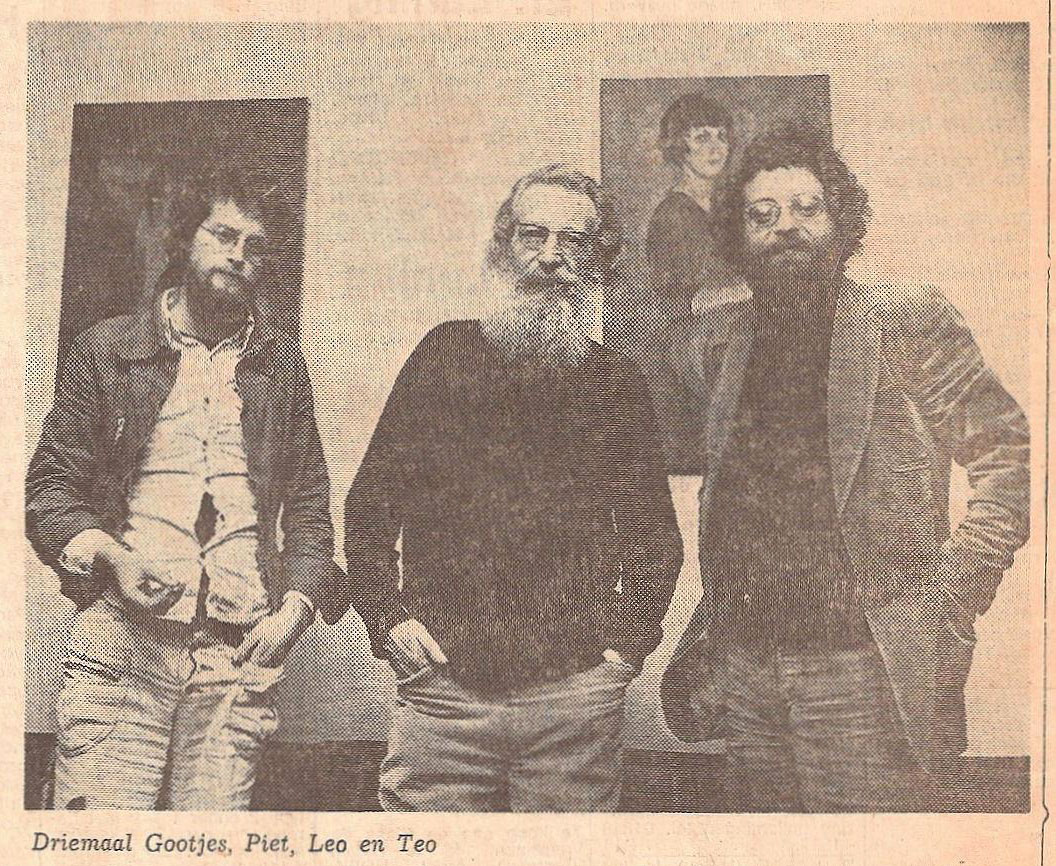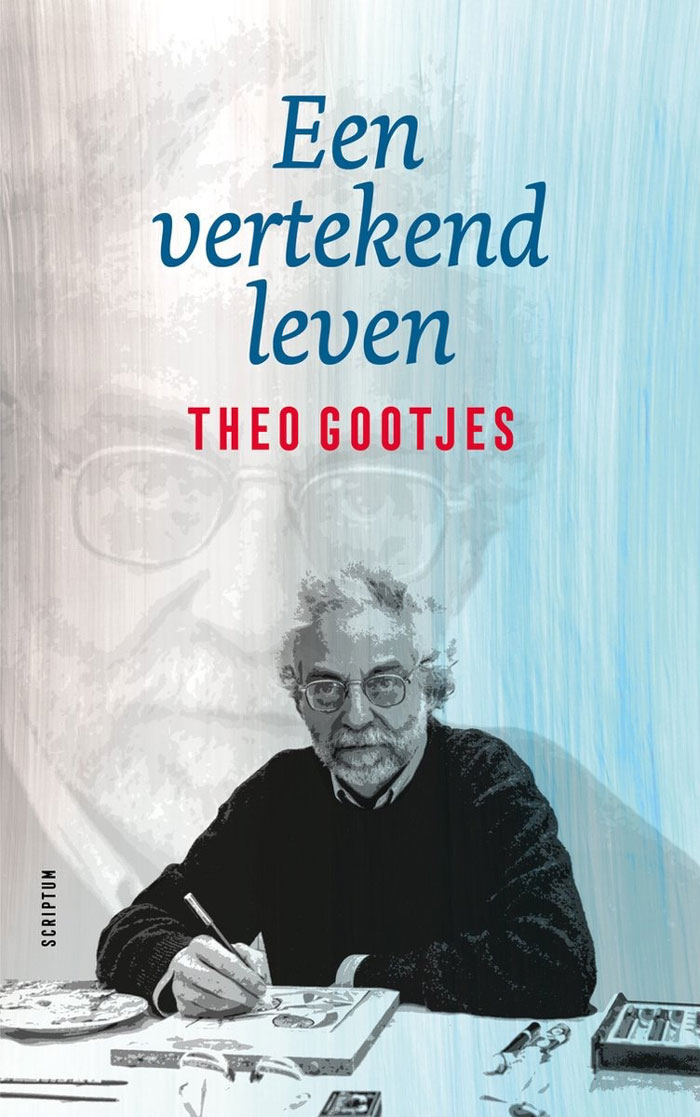"1961: Guest worker / 1991: Minority".
Theo Gootjes - sometimes written as "Teo Gootjes" - is a Dutch painter, graphic artist and political cartoonist. He was the long-time house cartoonist of the newspaper Het Vrije Volk (1973-1990) and, after its merger with Rotterdams Nieuwsblad, in Rotterdams Dagblad (1990-2005). Along with Peter van Reen and Willem, he is one of three Dutch political cartoonists who were once sued for libel over a cartoon.
Early life and career
Theodorus Leonardus Gootjes was born in 1942 in the harbor city of Rotterdam, where he was raised in an artistic family. His father Leo Gootjes was a painter and sculptor, who combined these activities with his day job as a school teacher. Theo's younger brother Piet Gootjes later became a painter as well. Raised in a Catholic household, Gootjes credited his religious upbringing for providing him with the moralistic view to comment on current affairs through political cartoons. It also gave him a sense of duty, to use his drawing talent to serve society. Throughout his life, Gootjes remained a devout Catholic, and even sang in the local church choir. Simultaneously, he also kept a critical stance towards religion. In an interview he explained that even though his impoverished family received financial support from the Church, they were frequently visited by a financial controller to check whether they didn't receive "too much money" from them. At age eight, he already felt this was so humiliating and unfair that he once kicked the church representative in the shins. As a political cartoonist, he never shied away from criticizing the Vatican and several of its dogmas.
Between 1956 and 1968, Gootjes studied at the Graphic Lyceum of Rotterdam. Among his graphic influences were Frits Müller, Siegfried Woldhek and the painter Vincent van Gogh. Later in life, he also expressed admiration for Paul Kusters, Joost Swarte and Sandra de Haan. After graduation, Gootjes worked as an advertising illustrator, but he disliked this stressful and creatively limiting job. Since no better offers were available, he kept doing it for two years.
Political cartoons
In 1970, Gootjes noticed an advertisement asking for a graphic designer in the socialist newspaper Het Vrije Volk, which was basically a party publication for the Dutch socialist party PvdA. Chief editor Herman Wigbold liked his drawings, but felt he would be more useful as a "graphic journalist", so Gootjes became the paper's courtroom sketch artist, covering publicized trials all over the country. In those days, people who went on trial were asked beforehand whether they wanted to be drawn by courtroom sketch artists and printed in papers afterwards. If they refused, the artists weren't allowed in the courtroom. After a while, this started to annoy Gootjes, especially since he had to travel such long distances to get to all the courtrooms.
In 1973, a new opportunity arose: Het Vrije Volk's long-time political cartoonist Frits Müller left and Gootjes was asked to be his successor. Up to that point, Gootjes hadn't been very interested in political cartoons. He usually just liked the artwork, but didn't pay much attention to the messages. As a result, he originally merely mimicked Müller's style, since he assumed that this was what a political cartoon ought to look like. When one time the historian and cartoon collector Koos van Weringh, a huge Frits Müller fan, visited the paper, he mistook Gootjes' cartoons for Müller's and only realized the mistake after taking the drawings home. Gradually, Gootjes started to enjoy cartooning and developed his own personal style. He took a more minimalist approach, trying to express his messages in as few lines as possible.
For almost four decades, Gootjes made cartoons about national and international current affairs. He always worked in black-and-white, since it also reflected his opinions: "I dislike searching for a middle ground: you either agree or disagree." When asked how he would summarize his point of view, Gootjes stated: "My cartoons are about the human deficit. Vices are of all ages." His personal favorite cartoon was made at the end of his career: 'Uitgeprocedeerd' (2005), about immigrants who are forcibly repatriated. The picture shows a lonely man in the distance, casting a large shadow behind him. From a different perspective, the figure also appears to stand on a plank, staring into an abyss.
"Healthcare" (1995). A rich man is nursed, a poor man is rolled away by the Grim Reaper.
Originally, Het Vrije Volk was a nationally syndicated newspaper. When Gootjes debuted in its pages, it had already become a regional paper, distributed in the Rotterdam area. The downside was that it lost sales as more loyal, but predominantly senior readers died off. The plus side was that Gootjes had more creative freedom to experiment, especially when he was named their editor of image editing. On 30 March 1991, Het Vrije Volk merged with another paper, Het Rotterdams Nieuwsblad, to become Rotterdams Dagblad. Gootjes joked: "Political cartoonist Albert Hahn stood at the cradle of Het Vrije Volk, I next to its grave." He became the new house cartoonist of Het Rotterdams Dagblad, but retired from his job as chief image editor to fully concentrate on political cartoons. Three times a week, he made a new drawing. In 2005, Het Algemeen Dagblad took over the Rotterdams Dagblad, after which Gootjes retired. In 1986, a collection of his political cartoons was compiled by Koos van Weringh and publisher Wolters Kluwer under the title 'Zonder Perspectief'.
'Uitgeprocedeerd' (2005), Theo Gootjes' favorite cartoon, depicting a forcibly repatriated man casting a large shadow behind him, which also looks as if he's standing on a plank above an abyss.
Controversy
Like most political cartoonists, Gootjes' work also caused occasional offense. In the early 1970s, one of his drawings had been printed next to an ad of the Radio Unie. The company executives felt so insulted by his illustration that they refused to advertise in the paper for half a year. In 2001, Gootjes drew the logo of oil multinational Shell with a corpse hanging from each letter. The drawing referred to a 1993 incident when the native Ogoni people in the Niger Delta protested against the local Shell factory. They accused the company of exploiting them, while polluting their environment. The Nigerian government arrested the demonstrators under false accusations and had nine of them executed. Shell Nigeria was accused of having bribed certain "witnesses" during these mock trials. After Gootjes' cartoon had been published, his editors issued a public apology the next day, printed on the front page. In 2017, however, Amnesty International confirmed that Shell Nigeria shared a responsibility for these murders and in 2021 the company was convicted on appeal.
Sometimes, Gootjes was confronted with censorship. In 2004, he drew a cartoon about a sex scandal surrounding politician Rob Oudkerk, who had been uncovered as a cocaine user and visitor of prostitutes. Gootjes had drawn Oudkerk with a rope tied around his erection, hanging himself. Editors of Rotterdams Dagblad refused to print it, unless Gootjes drew a black box in front of the penis. The cunning cartoonist sometimes came up with clever ways to avoid the censors. When the far-right party Lijst Pim Fortuyn scored high during the municipal elections in Rotterdam, Gootjes had made two cartoons. One showed party leader Pim Fortuyn literally fucking Rotterdam. The other depicted him and party member Jan Nagel as World War II-like NSB officers making the Nazi salute. His editor refused the first cartoon for being "too sexual", but accepted the second cartoon since she failed to recognize the Nazi collaborator uniforms of Fortuyn and Nagel. After the cartoon was printed, Gootjes received a tremendous backlash, even from fellow reporters, but he never regretted making it. Another time, he mocked Dutch Prime Minister Jan Peter Balkenende in a cartoon that went too far for his editors. Balkenende was head of the Christian-democratic party and a devout Christian. Gootjes drew him while Jesus garroted the politician in the neck. The cartoon was rejected, but Gootjes snuck it back in the office when his editors had a day off and an unsuspecting apprentice was in charge. The rejected cartoon ran in the next day's edition, much to the fury of his editors.
Gootjes noticed that most people were offended whenever he made a critical drawing about religion. He recalled that one disgruntled reader actually wrote: "If I ever notice Gootjes in front of my bumper, then I'll give full speed." But the cartoonist also noticed that people sometimes purely misinterpreted his message. One time he drew a cartoon about the rise of the far-right, with the dooming subtitle: "We're marching again." Some time later, he noticed that this very same drawing had been reprinted in a neo-Nazi magazine.
Illustrations from the "Gootjes Bible".
Artworks
Apart from political cartoons, Gootjes has also been active as a painter and sculptor. Many of his works have a socially conscious undertone, particularly regarding religion and the environment. In 1985, he drew a political cartoon criticizing the Vatican's stance on not accepting women for official clerical positions. The drawing depicts Jesus hanging backwards on the cross, hiding in shame over the atrocities committed in his name. In 2019, Gootjes turned this image into a real-life sculpture, 'Christus Keert Zich Af van de Rooms-Katholieke Kerk'. By that time, it had received another layer, referencing the cover-up of various pedophile sex scandals in the Roman-Catholic Church over the decades.
Gootjes has also made more apolitical art. His 'Blootjes van Gootjes' ("Nudes by Gootjes", 2007) was a series of 214 beer glass holders, depicting water paint drawings of nude women. They were exhibited in Galerie ‘t Walvis in Schiedam and on 31 August 2020 acquired by Schiedam's Municipal Museum.
Gootjesbijbel
In 1995, Gootjes spent a half year studying the Bible. He adapted the Song of Songs, the New Testament and the Apocalypse by rewriting the words in a small, precise handwriting and livening up each chapter with an illustration. A labor of love, he worked on the project until 2009. His 'Gootjesbijbel' ("Gootjes-Bible") was released that same year by De Althaea Pers.
Graphic contributions
Gootjes provided the illustrations for Rieks Veenker's book '21 Beestige Morabels' (Palmslag, 2017). In 2020, at the height of the COVID-19 corona pandemic, the Municipal Museum of Schiedam let 100 artists from the town of Schiedam make works of art to keep people's spirits up. Gootjes was one of them. In 2021, he also designed a special jenever bottle label for the Vrienden van het Jenever Museum.
Piet, Leo and Theo Gootjes, portrayed during their collective exposition in Dordrecht (9 February 1974).
Recognition
In February 1974, Gootjes, his brother and father held a collective exhibition in the architectural bureau Gerritse at the Spuiboulevard 296 in Dordrecht. On 27 January 2012, a retrospective expo of Gootjes' entire career was held at the CBK in Schiedam. Between 22 February and 4 October 2020, an exhibition ran in the Municipal Museum of Schiedam, titled 'Theo Gootjes: Altijd Zwart-wit. Meer Dan 30 Jaar Politiek Tekenen'. Historian and columnist Maarten van Rossem gave the opening speech. On 31 August of that same year, the museum bought three sculptures by Gootjes to add to their collection.
Recent years
Since the late 2010s, Theo Gootjes has made several sketches of old people in the retirement home Frankeland in Schiedam. He is moved by the tragedy of getting older and lonelier, "walking into infinity." On 19 December 2016, he donated all of his cartoons to the Atlas Van Stolk museum in Rotterdam and the rest of his personal archives to museum Het Markiezenhof in Bergen op Zoom. In September 2023, Gootjes released his autobiography 'Een Vertekend Leven' (Scriptum, 2023).
His son Matthijs Gootjes is also active as a visual artist.


